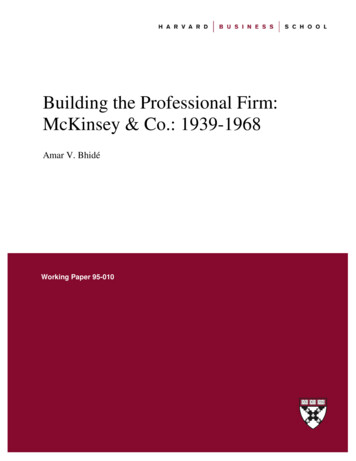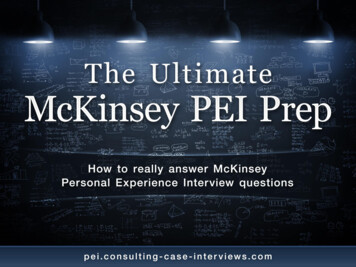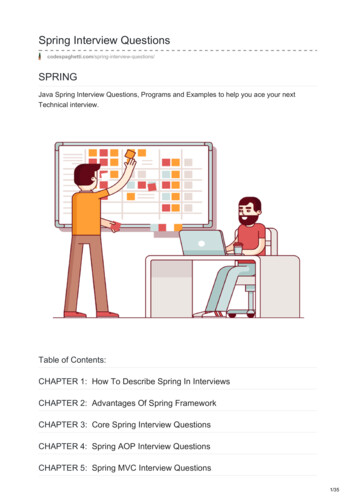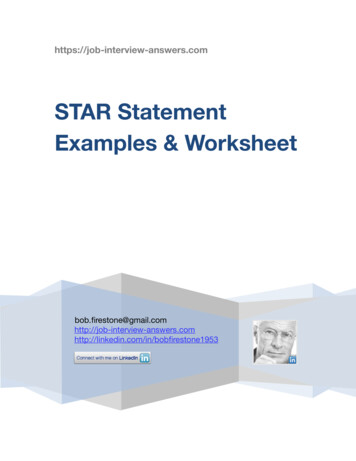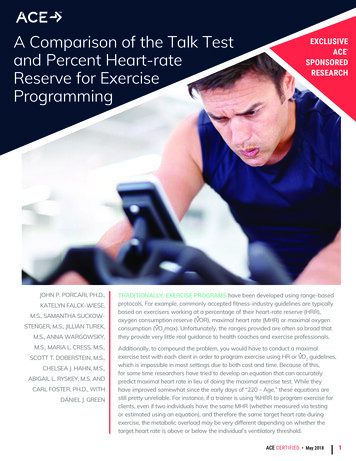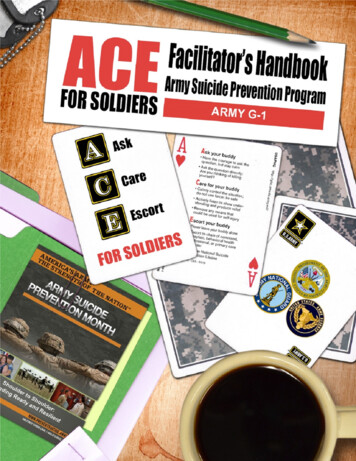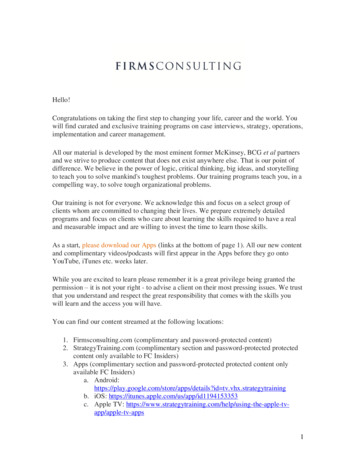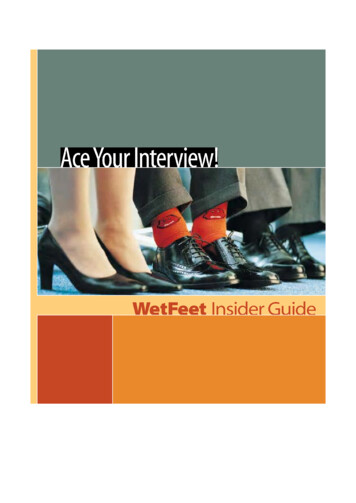
Transcription
ß½» Ç « ² » ª·» ÿØ» ·²¹ § « ³¿µ» -³¿ » ½¿ »» ¼»½·-· ²-ò
É» Ú»» ²½òThe Folger Building101 Howard StreetSuite 300San Francisco, CA 94105Phone: (415) 284-7900 or 1-800-926-4JOBFax: (415) 284-7910Website: www.WetFeet.comß½» Ç « ² » ª·» ÿISBN: 1-58207-369-4Photocopying Is ProhibitedCopyright 2004 WetFeet, Inc. All rights reserved. This publication is protected bythe copyright laws of the United States of America. No copying in any form ispermitted. It may not be reproduced, distributed, stored in a retrieval system, ortransmitted in any form or by any means, in part or in whole, without the expresswritten permission of WetFeet, Inc.
Ì¿¾ » º Ý ² »² ² » ª·» ·²¹ ¿ ¿ Ù ¿²½» ò ò ò ò ò ò ò ò ò ò ò ò ò ò ò ò ò ò ò ò ò ò ò ò ò ò ò ò ò ò ò ò ïÜ»³§- ·º§·²¹ » ² » ª·» Ð ½»-- ò ò ò ò ò ò ò ò ò ò ò ò ò ò ò ò ò ò ò ò ò ò ò ò íWhat Employers Want. . . . . . . . . . . . . . . . . . . . . . . . . . . . . . . . . . . . . . . . . . . . . . . . 5How to Give It to Them . . . . . . . . . . . . . . . . . . . . . . . . . . . . . . . . . . . . . . . . . . . . . 16Ù» ·²¹ λ¿¼§ ò ò ò ò ò ò ò ò ò ò ò ò ò ò ò ò ò ò ò ò ò ò ò ò ò ò ò ò ò ò ò ò ò ò ò ò ò ò ò ò îíKnow the Job. . . . . . . . . . . . . . . . . . . . . . . . . . . . . . . . . . . . . . . . . . . . . . . . . . . . . . 25Know the Organization . . . . . . . . . . . . . . . . . . . . . . . . . . . . . . . . . . . . . . . . . . . . . . 38Know Yourself. . . . . . . . . . . . . . . . . . . . . . . . . . . . . . . . . . . . . . . . . . . . . . . . . . . . . 43Line Up Your References. . . . . . . . . . . . . . . . . . . . . . . . . . . . . . . . . . . . . . . . . . . . . 53Þ¿-·½ ² » ª·» Û »½ ¿ · ²- ò ò ò ò ò ò ò ò ò ò ò ò ò ò ò ò ò ò ò ò ò ò ò ò ò ò ò ò ëéLook the Part . . . . . . . . . . . . . . . . . . . . . . . . . . . . . . . . . . . . . . . . . . . . . . . . . . . . . . 58Bring the Right Stuff . . . . . . . . . . . . . . . . . . . . . . . . . . . . . . . . . . . . . . . . . . . . . . . . 68Make an Entrance . . . . . . . . . . . . . . . . . . . . . . . . . . . . . . . . . . . . . . . . . . . . . . . . . . 71Say It with Body Language . . . . . . . . . . . . . . . . . . . . . . . . . . . . . . . . . . . . . . . . . . . 73Build Rapport . . . . . . . . . . . . . . . . . . . . . . . . . . . . . . . . . . . . . . . . . . . . . . . . . . . . . 77Master the Art of Q&A. . . . . . . . . . . . . . . . . . . . . . . . . . . . . . . . . . . . . . . . . . . . . . 79
Ù» ·²¹ Ü ² Þ ¿-- Ì¿½µ-æ ² » ª·» ̧ »- ò ò ò ò ò ò ò ò ò ò ò ò ò ò ò çíPhone Screen . . . . . . . . . . . . . . . . . . . . . . . . . . . . . . . . . . . . . . . . . . . . . . . . . . . . . . 94Online Screen. . . . . . . . . . . . . . . . . . . . . . . . . . . . . . . . . . . . . . . . . . . . . . . . . . . . . 100Job Fair Interview . . . . . . . . . . . . . . . . . . . . . . . . . . . . . . . . . . . . . . . . . . . . . . . . . 108Office-Visit Interview . . . . . . . . . . . . . . . . . . . . . . . . . . . . . . . . . . . . . . . . . . . . . . 113Ý ²½ «¼·²¹ Ù ¿½»º« §ò ò ò ò ò ò ò ò ò ò ò ò ò ò ò ò ò ò ò ò ò ò ò ò ò ò ò ò ò ò ò ò ò ïîëAsk Really Good Questions. . . . . . . . . . . . . . . . . . . . . . . . . . . . . . . . . . . . . . . . . . 126Have an Exit Strategy . . . . . . . . . . . . . . . . . . . . . . . . . . . . . . . . . . . . . . . . . . . . . . 130Follow Up . . . . . . . . . . . . . . . . . . . . . . . . . . . . . . . . . . . . . . . . . . . . . . . . . . . . . . . 134Ú Ç « λº» »²½» ò ò ò ò ò ò ò ò ò ò ò ò ò ò ò ò ò ò ò ò ò ò ò ò ò ò ò ò ò ò ò ò ò ò ò ïíéAdditional Interviewing Resources . . . . . . . . . . . . . . . . . . . . . . . . . . . . . . . . . . . . 138General Interviewing Advice . . . . . . . . . . . . . . . . . . . . . . . . . . . . . . . . . . . . . . . . . 140Job Search Resources . . . . . . . . . . . . . . . . . . . . . . . . . . . . . . . . . . . . . . . . . . . . . . . 142Background Research Tools. . . . . . . . . . . . . . . . . . . . . . . . . . . . . . . . . . . . . . . . . . 143Salary Negotiation Tools . . . . . . . . . . . . . . . . . . . . . . . . . . . . . . . . . . . . . . . . . . . . 146
² » ª·» ·²¹ ¿ ¿ Ù ¿²½»Ü»³§- ·º§·²¹ » ² » ª·» Ð ½»-- Instead of prepping for every conceivable question, concentrate on what youwant interviewers to know about your strengths. Tell memorable stories to illustrate your strengths. Highlight your experience as a valuable team player, not just a solo superstar;your interviewers top priority is finding coworkers who work well with others. Get a job description and read it carefully, so you know exactly what the jobentails and how you might shine in the position. Try a surefire but oft-overlooked job interview strategy: Show your enthusiasm.Ù» ·²¹ λ¿¼§ Match your strengths, experience, goals, and interests to those of yourprospective employer. Look for keyword cues in job postings to get a handleon what the job is really like, and identify your competitive advantages. Learn to read between the lines of job postings, so that you can ask smartquestions to identify whether this position is a good fit for you and impressyour interviewer. Bone up on the organization and industry using insider contacts, thecompany website, trade publications, news reports, and company reports. Be prepared for questions about lessons you ve learned the hard way,personal interests, career shifts, and long-term goals. Line up references that can best attest to your strengths, giving them anexplanation of the position and plenty of advance notice.Þ¿-·½ ² » ª·» Û »½ ¿ · ²- Make sure your outer appearance reflects the strengths you ll bring to the position. Leave them something to remember you by: articles about your work, extracopies of your resume, a portfolio to peruse.1
Control your voice, gestures, and other mannerisms to be sure your bodylanguage conveys good things about you. To build rapport, seek common ground and show your sense of humor. Loosen up and make your Q&A session a pleasant peer-to-peer interactioninstead of a lowly-applicant-to-all-powerful-examiner transaction. Come in prepared to answer common interview questions, and some toughones as well. ² » ª·» ̧ »- The phone screen is actually a first-round interview so prepare accordingly,with a cheat sheet of examples, anecdotes, and questions. Make a good impression on the phone with active listening and a confidenttone of voice. Sail through online screenings by asking yourself why the employer is askingthis question, what the expected answer is, and how you can give an answerthat is honest and presents your experience in the best light. Job fairs aren t just for students they re for anyone looking to switch careersor industries or expand their career horizons. Get comfortable with different interview approaches, including behavior-based,hypothetical, cases, job simulations, and panel interviews.Ý ²½ «¼·²¹ Ù ¿½»º« § Show your interest and aptitude with intelligent, informed questions. Probe for key information about the position diplomatically, to find outwhether this is a job you really want. Before you leave, take the opportunity to correct any misstatements, recapyour strengths, tell the interviewer you want the job, and ask about next steps. Use thank-you notes to reinforce the positive impression you ve made andstay top of mind when it s time to make a hiring decision.2
Ü»³§- ·º§·²¹ » ² » ª·» Ð ½»-‹ É ¿ Û³ §» - É¿² ¡ Ø Ù·ª» Ì »³3
Dating, dancing, walking on fire . . . interviewing has been compared to manyactivities, and there is some truth to each of these comparisons. Everyone hopesto hit it off with an interviewer and be welcomed into a new workplace like family.At its best interviewing can be quite a tango, where you feel as sharp as you look,give as good as you get on the Q&A, and make impressive career moves withadded flair. At its most harrowing, of course, interviewing can leave you feelingraked over the coals, with the flushed cheeks and cold sweat to prove it.But put the fears, dreams, hopes, and metaphors aside for a moment, and recognizethat at its most basic, an interview is simply a conversation about a job. You vehad conversations before, right? Then you ve already explored ideas with anotherperson, posed thoughtful questions, given considered answers, and kept theconversation rolling until it reached a natural conclusion. Congratulations you ve already got the basic skills needed to succeed in an interview.Additional preparation is needed for interviews, and of course there is more atstake for both participants you re talking about a possible career change, notjust the possibility of watching the game together on Sunday. This book will helpyou make the preparations necessary to keep that conversation focused, productive,and pleasant, so that you can keep your wits about you even when the stakesseem alarmingly high. Also sprinkled throughout the book are real-life anecdotesto help you keep the interview recommendations in perspective. No one gets itexactly right all the time, and yet interviewees almost always live to tell thetale and sometimes land the job, to boot.If this seems like a lot of extra effort for a half-hour conversation, just think whata difference that conversation can make to you, your career, and your family. Andremember, you re not in this alone. Your interviewer probably sat exactly whereyou are not long ago and is probably concerned about keeping up the other endof the conversation. Ultimately, you and your interviewer are both hoping forthe same thing from this conversation: You want it to go well and be the firststep toward a productive working relationship.4
É ¿ Û³ §» - É¿² The prospect of that worst-case-scenario interview is enough to make evenseasoned interviewees break out in a cold sweat. Trick questions. Brainteasers.Panel interrogations. Oh my! But as complicated and convoluted as their interviewquestions may sometimes seem, all employers really want is to identify a candidatewith a demonstrable capacity to deliver results, hire that person, and get back totheir other work before it starts to pile up. So give employers what they wantand be the candidate they re looking for.And what about all those esoteric hypothetical scenarios and trick questions? Goodnews: They re falling out of favor with employers, because they simply aren t thateffective. It used to be that interviewers would ask questions like, Tell me threegood things about yourself and three bad things or If you were a tree, whatkind of tree would you be? says William C. Byham, Ph.D., CEO of DevelopmentDimensions International, a human resources research and consulting firm. Now,they re much more likely to do what s known as behavioral interviewing, wherethey try to predict your future behavior by asking you for a detailed description ofwhat you ve done in the past in particular situations. The good news for candidatesis this kind of interview is actually easier to prepare for. (Source: Anne Fisher.Are You Ready for that Big Job Interview? Fortune. February 2, 2003.)So instead of preparing to rack your brains for answers to complicated questions,you should prepare to shine. Know your strengths, and highlight them in anecdotesabout previous professional experience. Smarts aren t the only asset that countswith employers in fact, being a team player is now considered even moreimportant. Make sure that the personal strengths you plan to emphasize in yourinterview match the demands of the position as indicated by the job descriptionand your background research. (If your strengths are not a strong match for the5
position, your time would be better spent looking elsewhere for a more suitableposition.) Then on the big day, present yourself as a candidate with specializedskills and general-audience appeal. Your confidence, enthusiasm, knowledge, andunderstanding should confirm what your interviewer is already predisposed tobelieve: That bringing you in for an interview was a wise move, and that hiringyou would be even more brilliant.When interviewing you, hiring managers are hoping to find the answers to somebasic questions without actually asking those questions. Forewarned is forearmed,so we ve broken these questions down for you in the following sections.Ü É¿² É µ · Ç «áMany candidates enter an interview prepared to recite a litany of skills and workexperience but interviewers aren t looking for a walking, talking resume. If you vebeen invited for an interview, they re already sufficiently intrigued by your skills.The reason they need to meet with you in person is to gauge the personal strengthsor competencies you would contribute to the team. Intangible attributes, suchas resourcefulness, initiative, creativity, adaptability, drive, and integrity, will setyou apart from other qualified candidates.Õ² § « - »²¹ -ò Think about which of your personal strengths would bemost useful in the position you ve applied for, and emphasize these in yourinterview. Not every one of your personal attributes will be applicable forexample, a tendency to thrive on competition might not be welcome in a small,laid-back office where you d be the only person in the sales department. But overall,you should find that the personal strengths necessary for this position closelymatch your own. Otherwise, your time might be more wisely spent finding a jobbetter suited to your strengths than interviewing for a position that goes completelyagainst your grain.6
Ì» ¿ ³»³ ¿¾ » - §ò It s critical to provide examples of how your strengthshave benefited previous employers. You should have an anecdote ready to illustrateeach of your personal strengths in action. Simply telling your interviewers thatyour attention to detail is impeccable without backing up that statement probablywon t convince them. If you really want to impress your interviewers with yourattention to detail, tell them about a time when you prevented your company fromhaving to release a new version of a software program by identifying a bug thathad gone undetected through two previous rounds of QA (i.e., quality assurancetesting). Leave your interviewers with that memorable mental image of you doublechecking every aspect of the software, and when it comes time to make a hiringdecision, they ll remember your outstanding attention to detail, not to mentionthe positive impact your strengths had on the company.Ù» § « - ·»- - ¿·¹ ò Unsupported statements about how great you areprobably won t sell your interviewers on your strengths, even if that statementcomes from a reference. So when you approach your colleagues for references,let them know which examples of your work might be most relevant to yourinterviewer. Here s how you might prompt a reference: I d be in charge of newsoftware development in this position, so they d probably be interested to hearabout that time we were working around the clock on product X, and I cameacross that bug. If your interviewers hear the same story from two differentsources, they re more likely to remember and believe it.É· Ç « Ó»- · » Ì»¿³áAccording to a 2003 study by the non-profit Level Playing Field Institute, bothemployees and employers consider being a team player to be of paramountimportance in the workplace in fact, respondents found it more importantthan doing a good job, being intelligent, being creative, making money for theorganization, and many other good qualities in terms of getting ahead in the7
Ý¿-» ·² Ð ·² æ Ý¿² Ù» ¿ É· ²»--áл - ²¿ »º» »²½»- - « ¼ ¾»ô » ô » - ²¿ ô -·²½» »³ §» - ¿ » ¿ ¿§- µ·²¹º »¿³ ³»³¾» - ¿ » ¾ º»--· ²¿ ¿²¼ » - ²¿¾ »ò Ð ³ § « »º» »²½»- ¼»-½ ·¾» ¿ »§Žª» »²¶ §»¼ ¿¾ « µ·²¹ · § «ô ¿²¼ »§ · » § « ¿²¼ » ¶ ¾ò Ý ²-·¼» » º ·²¹ ½¿-» ·² ·² æ ß - »½ ·ª» ½ ·»² ²½» ¿-µ»¼ ³» º »º» »²½»- ¿- ¿ º » -» »½ · ² ½»-º ¿ »¾-· » ¼»ª» ³»² ¶»½ Ž¼ ¾·¼ò - »² - ³» ·³» ·²µ·²¹ ¿¾ « »³¿·² ½ ²½» ²- ³§ - »½ ·ª» ½ ·»² ¿¼ » »--»¼æ ¿ » ¶ ¾ ¹» ¼ ²» · « ¾»·²¹ - »--º« ·² » ½»-- ¿²¼ ¿ » -· » ¾» ·²» »²-·ª» · « µ·²¹ ·µ»½ ²» - » » ½« ò Í ½¿ »¼ - ³» º ³§ » »¿ ½ ·»² - ¿²¼ ¿-µ»¼ »³ ¾» » ¿ »¼ ¼»-½ ·¾» ¿ § ·½¿ ¼¿§ µ·²¹ ² ¿ »¾-· » ¶»½ · ³» ¿²¼ ¼»-½ ·¾» ³«½ ¾» » »· -· »- µ»¼ ¿² »§Ž¼ » »½ »¼ò Þ»º » ²¹ ¹ » ²» ½¿ æ É» ¿² § « ² » ¶ ¾ò É»Ž » ½ ²ª·²½»¼ ¿ § « µ² ¼» ·ª» ½ »¿ ·ª· § ¿²¼ ª¿ «»‰¿²¼ » ¿² »¿ - ³» º »-» ¶ µ»- » µ» »¿ ·²¹ ¿¾ « ô ÿŽŒorganization. (Source: Level Playing Field Institute. How Opportunities in theWorkplace and Fairness Affect Intergroup Relations Study. www.lpfi.org.) Consideryourself warned: Since fitting in is a subjective criterion, it can be much tougherto satisfy than more objective qualifications, like skill sets.ͳ¿ - ¿ »²Ž -«ºº·½·»² ò During an interview, you should make an effort not onlyto impress your prospective employer with your smarts, but also to convey whata thoughtful, pleasant person you are to work with. As social theorist MalcolmGladwell points out in his influential article The Talent Myth: Are Smart PeopleOverrated?, employers are learning that intelligence isn t always the most desiredattribute for prospective employees, especially when it comes at the expense ofteamwork and collective common sense after all, perfectly smart people wereresponsible for the debacles at Enron and Arthur Andersen. (Read the articlefor yourself at www.gladwell.com.)8
Although many interviewees still seek to dazzle employers with their individualbrilliance, this is a rookie s mistake in a work world that is increasingly dependenton teamwork rather than brainiac star-power. Gladwell quotes Richard Wagner,a psychologist at Florida State University, as saying, What I.Q. doesn t pick upis effectiveness at common-sense sorts of things, especially working with people.In terms of how we evaluate schooling, everything is about working by yourself.If you work with someone else, it s called cheating. Once you get out in the realworld, everything you do involves working with other people. In fact, a researchstudy by Gartner Inc. estimates that by 2005, knowledge workers will spend nearly70 percent of their time working collaboratively. (Source: Rebuilding theCompetitive Foundation. Gartner Inc.)Ç « » ² » »¿³ò To show prospective employers that you re prepared forthe teamwork most jobs now entail, be sure to highlight your experiences aspart of a successful team not just your solo achievements in your interview.Managers can and should talk about their experience assembling a first-rateteam, for example, or the fact that their team surpassed quarterly projectionsfor six consecutive quarters. Specialized employees can emphasize their abilityto form effective collaborative partnerships spanning departments or areas ofexpertise for example, an editor might talk about working with the IT team tobuild an effective content management system, or a graphic designer mightdescribe her experience as part of the team responsible for a successful newproduct launch. É»Œ ½¿² ³¿µ» ¿ » ¼·ºº» »²½»ò If your interviewer asks you to describe whatyou would do in a work scenario, be sure your answer involves teamwork consulting colleagues, group brainstorming, or making use of expertise in otherdepartments. In other words, your response should not only include an explanationof what I would do, but also a statement of what we could accomplish witha collaborative approach. When you role-play your interview with a friend, notehow many times you use the word we, because your interviewers certainly will.9
Ý¿-» ·² Ð ·² æ ³ »-- »Ì»¿³Ü ²Ž ·²µ ¿ § «Ž » ¿ - ó·² º » ¶ ¾ ¶«- ¾»½¿«-» § «Žª» ·³ »--»¼ » » - ¿ ¾»ò Ó¿µ» · § « ³·--· ² ·³ »-- »ª» § ²» § « ½ ³» ·² ½ ² ¿½ · ·² » ·² » ª·» ½»--ò Ô»¿ ² § « »-- ² º ³ ·- ½¿-» ·² ·² æ λ½»² § ¿- ·² » ª·» ·²¹ - ³» ²» º ¿ -· · ² ² « »¿³ ¿- ¿² ·²-·¼» »º» ¿ ô ª» § » ½ ²²»½ »¼ » »½« ·ª»- ·² « ½ ³ ¿²§ò Í » ¿- »² § -³¿ ¿²¼ »² «-·¿- ·½ô ¾« - » ³«- ¿ª» º» ¿ » ¶ ¾ ¿- ¿ »¿¼§ ·² » ¾¿¹¾»½¿«-» - » ½¿³» ¼ »--»¼ ½¿-«¿ §ô »¿ ·²¹ ¶»¿²-ò Þ« ¿ ¾ » »¼ ³» ³ - º¿ ¿- ¿ » »² · » ·³» » ¿ µ»¼ô - » ¿- µ·²¹ « » ·²¼ å · ¿- ¿- ·º- » ¿¼ - ³» ¿½» ¾» » ¾»ò É· ² »§» ½ ² ¿½ ô » » ¿- ² ¿§ »- ¿¾ ·- «- » » » - » »¿ § ½¿ »¼ ¿¾ « » ¶ ¾ò É» ½ « ¼²Ž ¾» -« » - » ¿ »¿ § ¹ ·²¹ ¾» ¿ »¿³ ¿§» ô ¿²¼ ¿ ½ - » » «²· §òŒÜ Ç « λ¿ § ˲¼» - ¿²¼ » Ö ¾áBefore you head into any job interview, you need to know what you re in for and that means finding the following information in the job description:Ð -· · ² · »ò Many job seekers use titles as search criteria, and don t look twice atpositions with unfamiliar titles. But titles can be misleading, so don t be too quickto discount a job based on the title alone. The salary may be better than you expect,and the actual day-to-day responsibilities may be far more varied, interesting, andhigh-level than indicated by the title, too. So be sure to read over the companyinformation, day-to-day responsibilities, and salary before you decide whether aposition sounds promising.Ý ³ ¿²§ ·²º ³¿ · ²ò This may include the name, industry, history, and locationof the organization offering the position; use this information as the starting pointfor your research (see the next chapter). Sometimes the organization s name is not10
given in the posting. Don t be dismayed you may be able to figure out thecompany s name simply by checking the domain name in the contact e-mailaddress or through an Internet search that cross-references two or more of theorganizational specifics provided (e.g., industry and location).Ï«¿ ·º·½¿ · ²-ò This typically includes years of experience, core competencies orareas of specialization, required skill sets (e.g., software programs, language skills,other technical skills), and degrees or certifications. In addition to requiredqualifications, a job posting often lists desirable qualifications or skills; if youcan demonstrate that you meet these criteria, your application is likely to rise tothe top of the heap.Í¿ ¿ § ¿²¹»ò Employers do not always provide a salary range, and when they doit is usually listed as DOE (i.e., depending on experience). When organizationsmerely list the salary as competitive, it s up to you to find out what that meansbefore the interview so that you aren t unprepared when you re asked aboutyour salary expectations. Check salary surveys to find the average salary for theposition you are applying for by title, industry, years of experience, andgeographic location. (See For Your Reference, at the end of the book, for salarysurvey sources.)Þ»²»º· -ò Benefits include vacation, sick/personal leave, sabbaticals, comp/flex time,vision, dental, family/domestic partner insurance coverage, maternity/paternityleave, profit sharing, 401(k) plans, flexible spending accounts, reimbursementfor mileage/transportation, per diems, and the like. If a position is described as non-exempt, that typically means the employee in this position will be entitledto overtime pay or comp time for any hours worked beyond 40 hours per week.Before you accept the position, you should find out whether there are any limits onthe amount of comp time or overtime you can accrue. Some employers considertelecommuting a benefit, so if working from home interests you, be sure to askabout that, too.11
λ- ²-·¾· · ·»-ò This is a crucial part of the job description, since it gives youthe best sense of the day-to-day demands and rewards of the job. Too often,candidates focus on the salary offered and on the skills and experience requiredto land the job, and gloss over the responsibilities they will be required to fulfill.But if you take the time to get familiar with the specific responsibilities of aposition, you ll find that you are better able to Determine whether the position interests you. Match the requirements of the job to your experience and personal strengths. Anticipate the interviewer s questions. Prepare anecdotes that illustrate relevant strengths and experience. Ask informed questions to learn more about the position and the workplace.Ü Ç « ˲¼» - ¿²¼ Ñ« Þ«-·²»--áNow that you know something about the position and the skills and strengthsyou need to bring to it, you need to educate yourself on the company s business.In so doing, you will be preparing yourself for success not just in the interview,but on the job, too. This means research, research, research in each of the followingareas. Just how you should go about conducting this research is covered in thenext chapter. ²¼«- §ò A basic awareness of relevant industry terms and issues is crucial forany interview. This will help you anticipate the questions you ll be asked, speakto the competitive pressures the organization is facing, and ensure that you canunderstand the terminology your interviewer is using. If you re completely newto an industry, your interviewers will appreciate your effort to learn the ropesand take that as an indication that you re a quick, eager learner. If you ve beenin the business for years, you ll want demonstrate that you make a point ofstaying up-to-date on recent developments in your field.12
Ý¿-» ·² Ð ·² æ Ý ª» Õ»§ Þ»²»º· Ç « ³¿§ ² ¿² ¾ ·²¹ « ¾»²»º· - «² · ¿ » ·² » ·² » ª·» ½»--ô ¾« ¾»-« » § « ¿-µ ¿¾ « »³ ¾»º » § « ¿µ» » ¶ ¾ò Í« »ô § « ½¿² »ª»² «¿ § ¾¿ ¹¿·²º ¿ ¿§ ¿·-» ¿º » § «Ž » · »¼ô ¾« · Ž- ¿ ¼ ²»¹ ·¿ » ¾» » ¾»²»º· - ¿º » »º¿½ ò Ý »½µ « ¾»²»º· - ¿²¼ ½ ³ ¿²§ ·½·»- ² µ³¿²Ž- ½ ³ ô ¼·-¿¾· · §ô ¿²¼³¿ » ²· §ô ¿ » ²· §ô ¿²¼ » ¼» ó½¿ » »¿ª» »ª»² ·º § « ¼ ²Ž » »½ ²»»¼ »³‰§ « ²»ª» µ² ò Ý ²-·¼» » º ·²¹ ½¿-» ·² ·² æ Ó§ ½« »² ¶ ¾ ·- ²» º » ¾»- Žª» »ª» ¿¼ô ³ - § ¾»½¿«-» º ³§ ¾ --ò Ó§ ·² » ª·» · » ¿- »¼ í « -ô ³¿·² § ¾»½¿«-» » ¹ ¿ µ·²¹ ¿¾ « ¿ô » » » ¿ »² - ·ª» ¿²¼ » » Ž³ º ³ô ¿²¼ ¿ ³· · ² » ·²¹- ¿ ¿¼ ² ·²¹ ¼ · » ¶ ¾ò Ì » ¿½ «¿ ·² » ª·» ¿- »¼ ¿¾ « íð ³·²« »-ô ¿²¼ » »- ¿- ¶«- º«² ¹· ¿ µòŽ Ì » ² § · ½ ·- ¿ ²»¹ »½ »¼ ¿-µ ¿¾ « » ½ ³ ¿²§ ·½§ ¿¾ « ³¿ » ²· § »¿ª»ô ¿²¼ ·² » - »½ ·- ¿ ¿¼ò ¿¼ ² ·¼»¿ ¿ » ·³» ¿»ª» ¹ ·²¹ ¹» »¹²¿² ô ¾« · ¿ »²»¼ ² ²¹ ¿º » ¹ » ¶ ¾òŒÑ ¹¿²· ¿ · ²ò Researching the organization will help you determine whether thisis the right work environment for you, which of your skills and strengths mightespecially benefit the organization, and what specific organizational challengesyou may be able to help solve. This information should give you insight into theorganization s culture, needs, and expectations that will help you better preparefor the interview and not incidentally, give you a key advantage over othercandidates for the position. Knowledge is power!Ì»¿³ò Learn more about the team you ll be working with to gain a better senseof how you can contribute to and advance the team s goals. You ll also need toeducate yourself about the team s recent successes. Convey your excitement aboutthe team s accomplishments to your interviewer, and you ll be remembered asan enthusiastic, enterprising candidate who is likely to be an asset to the team.13
Ô¿- ô Þ« Ò Ô»¿- Once you ve done your homework, you may feel you have a solid grasp of theposition, industry, organization, and team but don t think you know it all just yet.In the interview, you should probe for further details and pay close attention toevery response your interviewer offers. When the interviewer makes an offhandremark about work styles or team and organizational culture, pay attention andbe sure to follow up with a probing question: I m intrigued to hear that canyou tell me more? Nonverbal cues are key, too: If you notice the interviewer makea face or hesitate before speaking, ask follow-up questions on the subject at handto draw your interviewer out a bit more.By asking questions, you may discover previously undisclosed demands or rewardsof the job. These are critical details that reveal what your interviewer is reallylooking for in a candidate and ultimately allow you to make an informed decisionabout whether to accept the job. Your interviewer s hints of a quirky boss andfrequent travel could prove problematic or promising, depending on yourperspective but it s far better to discover these details sooner rather than later.14
Ý¿-» ·² Ð ·² æ ¼»² ·º§ Û³ §» Ò»»¼- ² » Ú §Û³ §» - º »² ³· - ³» -¿ ·»² º¿½ - ¿¾ « ¿ -· · ² º ³ » ·²· ·¿ ¶ ¾ - ·²¹òÍ ³» ·³»-ô »§ ¶«- ¿ª»²Ž « ¼¿ »¼ » ¶ ¾ ¼»-½ · · ² ·² ¿ · »å » ·³»-ô ¿ ²» ¶»½ ·- ·¼»² ·º·»¼ ¿º » » ¿¼ ¿- - »¼ò É ¿ »ª» » ½¿«-»ô »-» «²¼·-½ -»¼ ·¼¾· - ½¿² ¹·ª» § « ¿ »¿ ¿¼ª¿² ¿¹» ª» » ½ ³ » · · ²ò Ý ²-·¼» ·- »¿ ó ·º» » ¿³ »æ É »² ¿- ·² » ª·» ·²¹ º » ¶ ¾ ¿ª» ² ô ²» º ³§ ·² » ª·» » - ³»² · ²»¼ ºº ¿²¼ ¿ » ½ ³ ¿²§ ¿- ¿²²·²¹ - ¿ «-·²¹ ¿² « -·¼» ª»²¼ º ¿ ¹ ¿ ·½ ¼»-·¹² ²»»¼-ô - ³» ·²¹ »§ ¿¼ ²»ª» ¼ ²» ¾»º » ¿²¼ «- » » ¿ · »½ ²½» ²»¼ ¿¾ « ò -»· »¼ » «²· § » ¿·² ¿ ¿¼ - »² í §»¿ - ·² ¿ »ª· «- -· · ² ³¿²¿¹·²¹ » » ¿ · ²- · · ¿² « -·¼» ¼»-·¹² ¿¹»²½§ ¿²¼ ¿ ¿¼ ·² ·³¿ » µ² »¼¹» º‰¿²¼ » » ·»²½» ¿ª ·¼·²¹‰ » »² ·¿ · º¿ - º-«½ ¿² ¿ ¿²¹»³»² ò ¿ - ·² »¼ « ¿ » » ·»²½» ·² ³§ ½ ²ª» -¿ · ²- · -«¾-» «»² ·² » ª·» » - ¿ » -¿³» ½ ³ ¿²§ô ¶«- ¾» -« » ¿ ¿ ½ ²½» ²»¼µ²» ¿ ¿¼ - ³» ·²¹ - »½·¿ ºº» ò µ² ¿ ½ ² ·¾« »¼ »· ¼»½·-· ² · » ³»òŒ15
Ø Ù·ª» Ì »³Once you ve learned something about the position and the organization from yourresearch and contacts plus any hints the interviewer offers you should have agood sense of which of your strengths to highlight
Title: erview.mdi Author: denis Created Date: 2/25/2005 12:00:11 PM
![[McKinsey Style Case] Ace Your Consulting Case Interviews](/img/64/wso-meat-processing-webinar-april-17-0-0.jpg)

